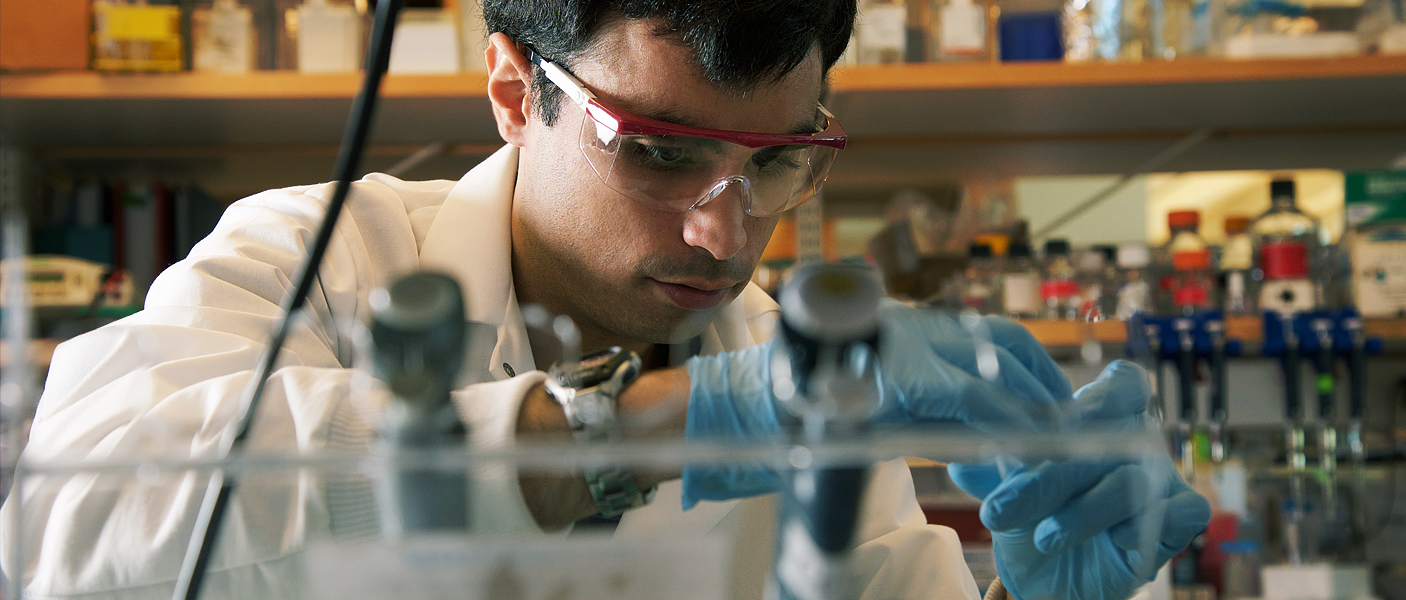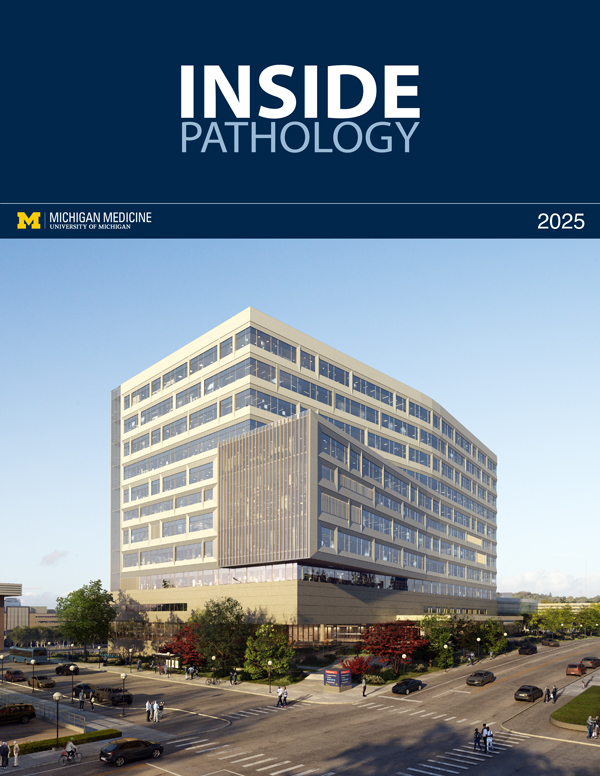

The University of Michigan offers a two-year fellowship in Laboratory Genetics and Genomics (LGG), accredited by the Accreditation Council for Graduate Medical Education (ACGME), which leads to eligibility for certification by the American Board of Medical Genetics and Genomics (ABMGG). The curriculum is designed to provide fellows with comprehensive training in both cytogenetics and molecular genetics, ultimately preparing them for independent practice.
The training takes place in the Division of Diagnostics Genetics and Genomics (DGG) in the Department of Pathology. Fellows rotate at Clinical Cytogenetics Laboratory, Molecular Genetics Laboratory, and Molecular Diagnostics Laboratory to gain experience in performing and interpreting cytogenetic and molecular tests in both germline and oncology cases. During each rotation, fellows work with well-trained lab staff and are mentored by qualified laboratory geneticists. Training includes new test validation, troubleshooting technical issues, results interpretation, report writing, and communication with laboratory teams and ordering providers, especially when handling challenging cases.
Didactic training is provided through formal coursework, case conferences, seminars, and journal clubs. Fellows complete courses including Pediatric Genetics Didactics and Medical Genetics (HG650, HG651). Fellows also participate in a variety of weekly and monthly didactic curriculum or other education activities throughout the two-year training including Medical Genetics Grand Rounds, Pediatric Genetics Journal Club, Pediatric Genetics Post-Clinical Case Review, Leukemia Tumor Board Case Review, and Molecular Conference.
Program Mission:
To graduate leaders in clinical laboratory genetics and genomics who can direct and interpret both clinical cytogenetic and molecular genetic analyses in a broad range of genetic disorders, including both inherited and acquired conditions
Program Aims:
Requirements:
Applicants must have a Ph.D. in either Genetics or a related field. We are not able to consider applicants with a MD, DO, or equivalent degrees from foreign countries. All individuals with a doctoral degree (Ph.D.) earned outside of the U.S., Canada, and Puerto Rico who are considering ABMGG certification must submit their credentials for review. The review will determine the equivalency of the doctoral degree and eligibility requirements to sit for ABMGG certification. Please use this link to review the necessary steps to obtain this review. We are not able to sponsor H1 visas.
Stipends:
Salary is commensurate with the current House Officer year one and year two salary schedule at the University of Michigan.
Applications:
The LGG program accepts one candidate every other year. The next LGG fellowship opportunity begins July 1, 2027. Please check back later for details about the application dates and more information. Application materials should include the following:
Please feel free to also visit the American Board of Medical Genetics and Genomics website and the Laboratory Genetics and Genomics Program Requirements from the ACGME.
 ON THE COVER
ON THE COVER
Breast team reviewing a patient's slide. (From left to right) Ghassan Allo, Fellow; Laura Walters, Clinical Lecturer; Celina Kleer, Professor. See Article 2014Department Chair |

newsletter
INSIDE PATHOLOGYAbout Our NewsletterInside Pathology is an newsletter published by the Chairman's Office to bring news and updates from inside the department's research and to become familiar with those leading it. It is our hope that those who read it will enjoy hearing about those new and familiar, and perhaps help in furthering our research. CONTENTS
|
 ON THE COVER
ON THE COVER
Autopsy Technician draws blood while working in the Wayne County morgue. See Article 2016Department Chair |

newsletter
INSIDE PATHOLOGYAbout Our NewsletterInside Pathology is an newsletter published by the Chairman's Office to bring news and updates from inside the department's research and to become familiar with those leading it. It is our hope that those who read it will enjoy hearing about those new and familiar, and perhaps help in furthering our research. CONTENTS
|
 ON THE COVER
ON THE COVER
Dr. Sriram Venneti, MD, PhD and Postdoctoral Fellow, Chan Chung, PhD investigate pediatric brain cancer. See Article 2017Department Chair |

newsletter
INSIDE PATHOLOGYAbout Our NewsletterInside Pathology is an newsletter published by the Chairman's Office to bring news and updates from inside the department's research and to become familiar with those leading it. It is our hope that those who read it will enjoy hearing about those new and familiar, and perhaps help in furthering our research. CONTENTS
|
 ON THE COVER
ON THE COVER
Director of the Neuropathology Fellowship, Dr. Sandra Camelo-Piragua serves on the Patient and Family Advisory Council. 2018Department Chair |

newsletter
INSIDE PATHOLOGYAbout Our NewsletterInside Pathology is an newsletter published by the Chairman's Office to bring news and updates from inside the department's research and to become familiar with those leading it. It is our hope that those who read it will enjoy hearing about those new and familiar, and perhaps help in furthering our research. CONTENTS
|
 ON THE COVER
ON THE COVER
Residents Ashley Bradt (left) and William Perry work at a multi-headed scope in our new facility. 2019Department Chair |

newsletter
INSIDE PATHOLOGYAbout Our NewsletterInside Pathology is an newsletter published by the Chairman's Office to bring news and updates from inside the department's research and to become familiar with those leading it. It is our hope that those who read it will enjoy hearing about those new and familiar, and perhaps help in furthering our research. CONTENTS
|
 ON THE COVER
ON THE COVER
Dr. Kristine Konopka (right) instructing residents while using a multi-headed microscope. 2020Department Chair |

newsletter
INSIDE PATHOLOGYAbout Our NewsletterInside Pathology is an newsletter published by the Chairman's Office to bring news and updates from inside the department's research and to become familiar with those leading it. It is our hope that those who read it will enjoy hearing about those new and familiar, and perhaps help in furthering our research. CONTENTS
|
 ON THE COVER
ON THE COVER
Patient specimens poised for COVID-19 PCR testing. 2021Department Chair |

newsletter
INSIDE PATHOLOGYAbout Our NewsletterInside Pathology is an newsletter published by the Chairman's Office to bring news and updates from inside the department's research and to become familiar with those leading it. It is our hope that those who read it will enjoy hearing about those new and familiar, and perhaps help in furthering our research. CONTENTS
|
 ON THE COVER
ON THE COVER
Dr. Pantanowitz demonstrates using machine learning in analyzing slides. 2022Department Chair |

newsletter
INSIDE PATHOLOGYAbout Our NewsletterInside Pathology is an newsletter published by the Chairman's Office to bring news and updates from inside the department's research and to become familiar with those leading it. It is our hope that those who read it will enjoy hearing about those new and familiar, and perhaps help in furthering our research. CONTENTS
|
 ON THE COVER
ON THE COVER
(Left to Right) Drs. Angela Wu, Laura Lamps, and Maria Westerhoff. 2023Department Chair |

newsletter
INSIDE PATHOLOGYAbout Our NewsletterInside Pathology is an newsletter published by the Chairman's Office to bring news and updates from inside the department's research and to become familiar with those leading it. It is our hope that those who read it will enjoy hearing about those new and familiar, and perhaps help in furthering our research. CONTENTS
|
 ON THE COVER
ON THE COVER
Illustration representing the various machines and processing used within our labs. 2024Department Chair |

newsletter
INSIDE PATHOLOGYAbout Our NewsletterInside Pathology is an newsletter published by the Chairman's Office to bring news and updates from inside the department's research and to become familiar with those leading it. It is our hope that those who read it will enjoy hearing about those new and familiar, and perhaps help in furthering our research. CONTENTS
|
 ON THE COVER
ON THE COVER
Rendering of the D. Dan and Betty Khn Health Care Pavilion. Credit: HOK 2025Department Chair |

newsletter
INSIDE PATHOLOGYAbout Our NewsletterInside Pathology is an newsletter published by the Chairman's Office to bring news and updates from inside the department's research and to become familiar with those leading it. It is our hope that those who read it will enjoy hearing about those new and familiar, and perhaps help in furthering our research. CONTENTS
|

MLabs, established in 1985, functions as a portal to provide pathologists, hospitals. and other reference laboratories access to the faculty, staff and laboratories of the University of Michigan Health System’s Department of Pathology. MLabs is a recognized leader for advanced molecular diagnostic testing, helpful consultants and exceptional customer service.